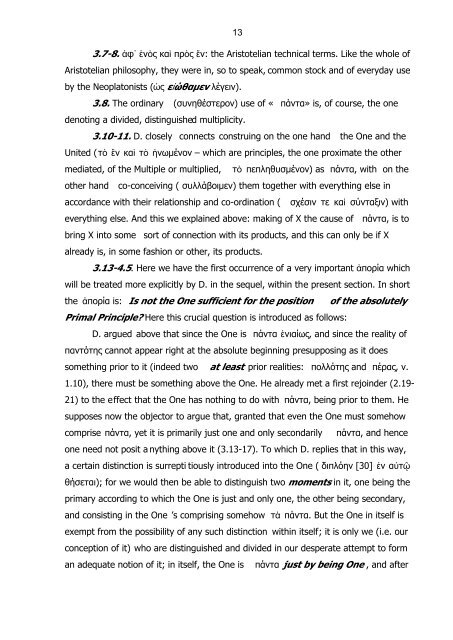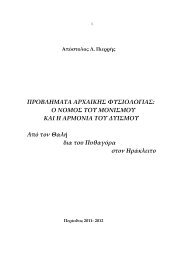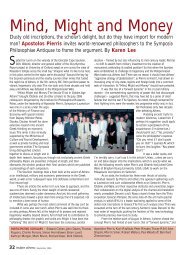Commentary on the Beginning of Damascius' De Primis Principiis
Commentary on the Beginning of Damascius' De Primis Principiis
Commentary on the Beginning of Damascius' De Primis Principiis
You also want an ePaper? Increase the reach of your titles
YUMPU automatically turns print PDFs into web optimized ePapers that Google loves.
133.7-8. ἀφ᾿ ἑνὸς καὶ πρὸς ἕν: <strong>the</strong> Aristotelian technical terms. Like <strong>the</strong> whole <strong>of</strong>Aristotelian philosophy, <strong>the</strong>y were in, so to speak, comm<strong>on</strong> stock and <strong>of</strong> everyday useby <strong>the</strong> Neoplat<strong>on</strong>ists (ὡς εἰώθαμεν λέγειν).3.8. The ordinary (συνηθέστερον) use <strong>of</strong> « πάντα» is, <strong>of</strong> course, <strong>the</strong> <strong>on</strong>edenoting a divided, distinguished multiplicity.3.10-11. D. closely c<strong>on</strong>nects c<strong>on</strong>struing <strong>on</strong> <strong>the</strong> <strong>on</strong>e hand <strong>the</strong> One and <strong>the</strong>United (τὸ ἓν καὶ τὸ ἡνωμένον – which are principles, <strong>the</strong> <strong>on</strong>e proximate <strong>the</strong> o<strong>the</strong>rmediated, <strong>of</strong> <strong>the</strong> Multiple or multiplied, τὸ πεπληθυσμένον) as πάντα, with <strong>on</strong> <strong>the</strong>o<strong>the</strong>r hand co-c<strong>on</strong>ceiving ( συλλάβοιμεν) <strong>the</strong>m toge<strong>the</strong>r with everything else inaccordance with <strong>the</strong>ir relati<strong>on</strong>ship and co-ordinati<strong>on</strong> ( σχέσιν τε καὶ σύνταξιν) wi<strong>the</strong>verything else. And this we explained above: making <strong>of</strong> X <strong>the</strong> cause <strong>of</strong> πάντα, is tobring X into some sort <strong>of</strong> c<strong>on</strong>necti<strong>on</strong> with its products, and this can <strong>on</strong>ly be if Xalready is, in some fashi<strong>on</strong> or o<strong>the</strong>r, its products.3.13-4.5. Here we have <strong>the</strong> first occurrence <strong>of</strong> a very important ἀπορία whichwill be treated more explicitly by D. in <strong>the</strong> sequel, within <strong>the</strong> present secti<strong>on</strong>. In short<strong>the</strong> ἀπορία is: Is not <strong>the</strong> One sufficient for <strong>the</strong> positi<strong>on</strong> <strong>of</strong> <strong>the</strong> absolutelyPrimal Principle? Here this crucial questi<strong>on</strong> is introduced as follows:D. argued above that since <strong>the</strong> One is πάντα ἑνιαίως, and since <strong>the</strong> reality <strong>of</strong>παντότης cannot appear right at <strong>the</strong> absolute beginning presupposing as it doessomething prior to it (indeed two at least prior realities: πολλότης and πέρας, v.1.10), <strong>the</strong>re must be something above <strong>the</strong> One. He already met a first rejoinder (2.19-21) to <strong>the</strong> effect that <strong>the</strong> One has nothing to do with πάντα, being prior to <strong>the</strong>m. Hesupposes now <strong>the</strong> objector to argue that, granted that even <strong>the</strong> One must somehowcomprise πάντα, yet it is primarily just <strong>on</strong>e and <strong>on</strong>ly sec<strong>on</strong>darily πάντα, and hence<strong>on</strong>e need not posit a nything above it (3.13-17). To which D. replies that in this way,a certain distincti<strong>on</strong> is surrepti tiously introduced into <strong>the</strong> One ( διπλόην [30] ἐν αὐτῷθήσεται); for we would <strong>the</strong>n be able to distinguish two moments in it, <strong>on</strong>e being <strong>the</strong>primary according to which <strong>the</strong> One is just and <strong>on</strong>ly <strong>on</strong>e, <strong>the</strong> o<strong>the</strong>r being sec<strong>on</strong>dary,and c<strong>on</strong>sisting in <strong>the</strong> One ’s comprising somehow τὰ πάντα. But <strong>the</strong> One in itself isexempt from <strong>the</strong> possibility <strong>of</strong> any such distincti<strong>on</strong> within itself; it is <strong>on</strong>ly we (i.e. ourc<strong>on</strong>cepti<strong>on</strong> <strong>of</strong> it) who are distinguished and divided in our desperate attempt to forman adequate noti<strong>on</strong> <strong>of</strong> it; in itself, <strong>the</strong> One is πάντα just by being One , and after










